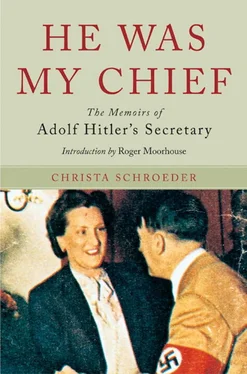Christa Schroeder - He Was My Chief - The Memoirs of Adolf Hitler's Secretary
Здесь есть возможность читать онлайн «Christa Schroeder - He Was My Chief - The Memoirs of Adolf Hitler's Secretary» весь текст электронной книги совершенно бесплатно (целиком полную версию без сокращений). В некоторых случаях можно слушать аудио, скачать через торрент в формате fb2 и присутствует краткое содержание. Город: Barnsley, Год выпуска: 2012, ISBN: 2012, Издательство: Frontline Books, Жанр: История, Биографии и Мемуары, на английском языке. Описание произведения, (предисловие) а так же отзывы посетителей доступны на портале библиотеки ЛибКат.
- Название:He Was My Chief: The Memoirs of Adolf Hitler's Secretary
- Автор:
- Издательство:Frontline Books
- Жанр:
- Год:2012
- Город:Barnsley
- ISBN:978-1-7830-3064-4
- Рейтинг книги:4 / 5. Голосов: 1
-
Избранное:Добавить в избранное
- Отзывы:
-
Ваша оценка:
- 80
- 1
- 2
- 3
- 4
- 5
He Was My Chief: The Memoirs of Adolf Hitler's Secretary: краткое содержание, описание и аннотация
Предлагаем к чтению аннотацию, описание, краткое содержание или предисловие (зависит от того, что написал сам автор книги «He Was My Chief: The Memoirs of Adolf Hitler's Secretary»). Если вы не нашли необходимую информацию о книге — напишите в комментариях, мы постараемся отыскать её.
He Was My Chief: The Memoirs of Adolf Hitler's Secretary — читать онлайн бесплатно полную книгу (весь текст) целиком
Ниже представлен текст книги, разбитый по страницам. Система сохранения места последней прочитанной страницы, позволяет с удобством читать онлайн бесплатно книгу «He Was My Chief: The Memoirs of Adolf Hitler's Secretary», без необходимости каждый раз заново искать на чём Вы остановились. Поставьте закладку, и сможете в любой момент перейти на страницу, на которой закончили чтение.
Интервал:
Закладка:
When I failed to reply promptly to her enquiry the matter was dropped for a considerable period. As far as she was concerned that was an end to it. Once Frau Schroeder returned from hospital after the removal of a carcinoma, however, she raised the matter of the notes again, and of my compiling them together with a commentary. At the time she could not flex her fingers and had difficulty in typing. She also tired very quickly. The day before she left for the Schlossberg Clinic at Oberstaufen she invited me to call and we spoke in detail about the publication of her notes in the presence of the female friend with whom she was to travel on the morrow. On her return by ambulance she was clearly seriously ill. A few days later she telephoned and asked me to drop by. After explaining that she was to be re-admitted to hospital she gave me a large, old black trunk containing her literary bequest. She was anxious that under no circumstances ‘should her entire literary estate fall into the hands of journalists, or no matter who,’ and I should remember what she had always said and wanted.
Complying with her wish that her notes should be published after her death, and recognizing that they contained much interesting material, I arranged them in order and supplied the commentary. If the book does not always appear to flow smoothly, the reason is that it was necessary to use incomplete pages of manuscript and single detail notes just as Christa Schroeder prepared them and wanted them published.
Emilie Christine Schroeder was born on 19 March 1908 in Hannoversch Münden. Her relationship with her mother was not close. The mother was a single parent with a very strong personality who failed to provide her daughter with the warmth and affection she probably craved. The mother died in 1926 when Christa was 18, leaving her orphaned and alone.
After completing secondary education on 11 April 1922 she began a three-year commercial training course at a firm owned by distant relatives, C.F. Schroeder Schmiergelwerke KG, in her home town. Meanwhile she also attended the Commercial Career and Business School, completing her training on 1 April 1925, and continued working thereafter for the Schroeder firm as a shorthand typist until 19 July 1929. She had a great talent for shorthand writing which she continued to develop by intensive continuation training and courses. She often took part in shorthand competitions and not infrequently would emerge with first prize.
In October 1929 she left Hannoversch Münden for Nagold, Württemberg, where she was employed as the sole legal secretary to an attorney. She remained there until 20 February 1930 when she left for Munich in search of a better position and to advance her career. In this period of the Great Depression, Germany had almost 7 million unemployed, and in Munich it was not easy to find a position. She applied to many companies, and responded to newspaper advertisements including one inserted by the NSDAP (Nazi Party) Reich Leadership at Schellingstrasse 50. [5] Following Hitler’s release from Landsberg Prison, the NSDAP was reconstituted on 17 February 1925 in a single room at the premises of a publisher at Thierschstrasse 15. As this room was soon inadequate for the membership, on 4 June 1925 several rooms were rented in a building at the rear of Schellingstrasse 50. Although further parts of the premises front and back continued to be rented, the needs of the Party administration soon outgrew them.
She was selected from amongst 87 applicants for her outstanding skill and ability. She took up her post in March 1930 and worked in various departments there until 1933. After the election to power of Adolf Hitler on 30 January 1933, various NSDAP Staffs removed to Berlin on 4 March 1933. Frau Schroeder went to Berlin with them at her own request because she was feeling the heat from the Gestapo over her alleged friendship with a Jew the previous year. A short while later while helping out at the Reich Chancellery she came to the attention of Hitler and was transferred into the ‘Personal Adjutancy of the Führer’. Early on the Adjutancy consisted of eight or so persons and served as a liaison and communications centre for journeys, the setting of agendas, arranging receptions and so forth, later it expanded to accommodate the military. Frau Schroeder worked at the Reich Chancellery until the outbreak of war in 1939 and was then more mobile as one of Hitler’s secretaries. She was in the entourage on all journeys and active at all Führer-HQs (FHQs). Wilhelm Brückner, [6] Oberst Wilhelm Brückner (b. 11.12.1884 Baden-Baden, d. 18.8.1954 Herbstdorf, Traunstein). First World War military service France and Romania, 1918 oberleutnant. 1919 Reichswehr and Freikorps Epp, Munich. 1922 SA-Führer (Munich Regt): involved in failed putsch 1924. 1925–8 active as sports trainer. 1.8.1930 Hitler’s adjutant. 1.7.1932 SA-Oberführer. 1.3.1933 SA-Gruppenführer, 1.9.1934 SA-Obergruppenführer, chief adjutant. 18.10.1940 dismissed by Hitler, rejoined army in rank of major, served in France: 1.12.1944 oberst: 4.5.1945 while hospitalised for a wound at Traunstein interned by US Army: released 22.9.1948.
then Hitler’s chief adjutant, described her as follows:
I have known Fräulein Schroeder since 1930. From then until about 1933 she was a secretary in the Reich Directorate of the Supreme SA Command (OSAF), then worked for the head of the Economics Division. In 1933 she transferred from Munich to Berlin with the Liaison Staff. Recommended for her great ability and social graces she arrived eventually in the Führer’s Adjutancy as my secretary.
For her typing and shorthand abilities, and her talent for independent working, she was appointed secretary to Adolf Hitler. In all these positions absolute confidentiality◦– particularly in the latter◦– was essential. Fräulein Schroeder fulfilled completely all expectations made of her through her unfaltering devotion to duty, her abilities linked to fast comprehension and her independent collaboration when taking dictation. Through her tact, social graces and circumspection she proved herself particularly on journeys and in the various FHQs.
Dr Karl Brandt described Frau Schroeder during his interrogation at the Nuremberg War Crimes Tribunal:
She is a woman who speaks her mind; Christa Schroeder was a different kind of person from Fräulein Wolf. [7] Johanna Wolf (b. 1.6.1900 Munich, d. 5.6.1985 Munich). 1923 private secretary to Hitler’s mentor Dietrich Eckart; 1922–8 secretary to Landtag ‘Völkischer Block’ deputy Dr Alexander Glaser; 5.1928 secretary to Gregor Strasser; 1929 employed by Hitler’s private chancellery; 1.11.1929 joined NSDAP, secretary to Rudolf Hess; from 1930 secretary to Hitler’s adjutant Wilhelm Brückner; 1933 transferred to Berlin with Hitler’s Chancellery and attached to Personal Adjutancy as Hitler’s personal secretary. Was often unwell and did not stand flights and road journeys well. Hitler always protected her against efforts to have her replaced. Left Berlin on Hitler’s order 21.4.1945; arrested by US forces at Bad Tölz, 23.5.1945; interned; opposed to Frau Schroeder’s negotiations with Zoller; released 14.1.1948.
At the beginning of the war this pair alone handled all Hitler’s secretarial business. Clever, critical and intelligent, Schroeder had a turnover of work which no other secretary ever matched. She could often spend several days and nights almost without a break taking dictation. She would always express her opinion openly and with conviction, and this led on occasion to serious altercations. She held herself apart from the private circle, or Hitler kept her out of it deliberately because he could not tolerate her criticisms. As Fräulein Schroeder’s intentions were completely honest this hurt her to the quick and as time went on she became sharply critical of Hitler himself. By doing so her boldness undoubtedly put her life in grave danger.
Интервал:
Закладка:
Похожие книги на «He Was My Chief: The Memoirs of Adolf Hitler's Secretary»
Представляем Вашему вниманию похожие книги на «He Was My Chief: The Memoirs of Adolf Hitler's Secretary» списком для выбора. Мы отобрали схожую по названию и смыслу литературу в надежде предоставить читателям больше вариантов отыскать новые, интересные, ещё непрочитанные произведения.
Обсуждение, отзывы о книге «He Was My Chief: The Memoirs of Adolf Hitler's Secretary» и просто собственные мнения читателей. Оставьте ваши комментарии, напишите, что Вы думаете о произведении, его смысле или главных героях. Укажите что конкретно понравилось, а что нет, и почему Вы так считаете.












